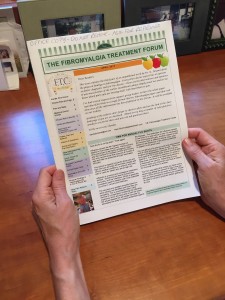 As a person with fibromyalgia and a physician treating fibromyalgia patients I am well aware of the disrupted sleep pattern most of us have and attuned to this topic. The results of a 2014 study in the Journal of Clinical Neurophysiology surprised me and upon review have changed my patient recommendations.
As a person with fibromyalgia and a physician treating fibromyalgia patients I am well aware of the disrupted sleep pattern most of us have and attuned to this topic. The results of a 2014 study in the Journal of Clinical Neurophysiology surprised me and upon review have changed my patient recommendations.
Dr. Victor Rosenfeld and his team analyzed 385 people (133 with fibromyalgia) by conducting comprehensive overnight sleep studies. The team found that 45% of people with fibromyalgia in the study had obstructive sleep apnea (OSA) – twice the rate of obstructive sleep apnea (OSA) found in the general population. Many of the people with fibromyalgia found to have OSA did not have the usual risk factors of obesity or snoring. Simply having fibromyalgia was a risk factor for obstructive sleep apnea.
After reviewing and considering this study, I began to recommend that all my new fibromyalgia patients 30 years of age and over ask their primary care doctors to order an overnight sleep study. A couple of my patients noted that their primary care physicians grumbled while writing the prescription because they were not used to thinking that OSA could occur in young fibromyalgics without the typical risk factors of obesity or snoring, but it turns out that 50% of my patients do indeed have obstructive sleep apnea. I am now talking to my existing patients 30 years of age and older about the importance of having an up to date sleep study.
Why is it important to treat OSA? The Mayo Clinic notes, “Sudden drops in blood oxygen levels that occur during sleep apnea increase blood pressure and strain the cardiovascular system. The more severe the obstructive sleep apnea the greater the risk of coronary artery disease, heart attack, heart failure (perhaps men only) and stroke.” Some fibromyalgia patients with OSA who start getting adequate oxygen during sleep note they have less fatigue, mental fog and pain during the day.
Much has changed in the past few years: overnight sleep study centers are more comfortable and many patients find they often sleep tolerably well during the study. No longer is a huge uncomfortable oxygen mask the only treatment for OSA. An overnight sleep study can determine if you have sleep disordered breathing treatable by oral appliances, nighttime oxygen delivery or other methods. If you have fibromyalgia you are at higher risk for OSA and properly treating it could improve your health and the way you feel.
This article was published in the April 2015 edition of the Fibromyalgia Treatment Forum: http://www.fibromyalgiatreatment.com/newsletter.html
